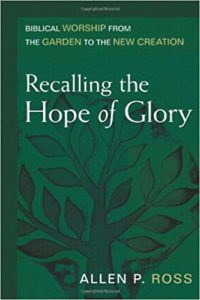Recalling the Hope of Glory | Allen Ross
 Ross, Allen P. Recalling the Hope of Glory: Biblical Worship from the Garden to the New Creation. Grand Rapids, MI: Kregel Publications, 2006.
Ross, Allen P. Recalling the Hope of Glory: Biblical Worship from the Garden to the New Creation. Grand Rapids, MI: Kregel Publications, 2006.
Amidst a secular cultural landscape and within an ever-present climate of debate over what constitutes true Christian worship, the importance of turning to Scripture for guidance is abundantly clear. Allen P. Ross, professor of divinity and Old Testament at Beeson Divinity School, wrote Recalling the Hope of Glory as a comprehensive guide to the biblical passages about worship, spanning from Creation to Revelation. Ross argues that for worship to be a true and proper response to the revelation of God, the church must fully understand and faithfully commit to the “biblical theology that informs worship” and have a clear vision of God’s glory (38). His written praise of God effectively models for the reader the proper mindset for worship.
Although a multifaceted term, Ross defines worship as the “obedient” and “appropriate response to the revelation of the holy God of glory.” (50). The author asserts that rather than indicating specific worship styles or methods, the Bible is much more concerned “with proper attitudes and expressions” (74). Worship can be a “transcendent meeting” with God only when it is inspired by the vision of his glory, which is the “most dramatic manifestation” of his presence (39, 46). Because God is holy and perfect in all his ways—in his omnipotence, omniscience, omnipresence, and eternal righteousness—Ross admonishes the reader that if this vision of God’s glory and his sublimity is forgotten or forsaken, so too will “adoration, reverence, obedience, and service” be impaired and severely diminished (49).
Thus, Ross observes that the full biblical narrative must be realized by Christian worshipers because it reveals the character and basis for God-centered worship. For example, the biblical story of Creation provides the “pattern for God’s great work of redemption” and points to re-creation (81). The new beginning after the great flood corresponds to the new beginning after Christ’s resurrection. Before the fall of Adam, the Garden of Eden was a sanctuary—a place where “God’s presence dwells” and a place to enter the rest of God (83). Israel’s Temple was modeled after this Paradise, both to recall its memory and to look forward to the Paradise to come (108).
The author reveals further that at the heart of true worship is sacrifice—in other words, true worship is costly to the worshiper (208). During the patriarchal era, this sacrifice was accomplished through the shed blood of animals; in the fullness of time, Christ accomplished the eternally perfect sacrifice, shedding his blood upon the cross for the sins of the world. Worship that offers sacrifice enables the consecration of a people for service to God.
Another recurrent theme in Ross’s discussion is that worship is eschatological. Because Scripture is full of prophetic admonitions, Ross states that all activity in worship should be performed with an eye toward the coming Kingdom of God and “in anticipation of the fulfillment of the promises” of the prophets (510). For example, the glorious scenes of worshiping the exalted Christ in the book of Revelation point to the future reality of the Lord dwelling amongst his people, reflecting perfectly his beauty, holiness, and glory.
Because of its extensively detailed, all-encompassing study of the biblical passages concerning worship, Ross’s volume is perfectly suited for pastors and church musicians, and all who serve in church leadership positions. Its usefulness, however, extends to any lay person in the church who seeks to sincerely worship God in spirit and in truth. Ross’s central message—that a biblically sound worship theology is necessary for a proper response to the revelation of God—is a timely reminder for all Christians who wait expectantly for “the hope of glory.”
